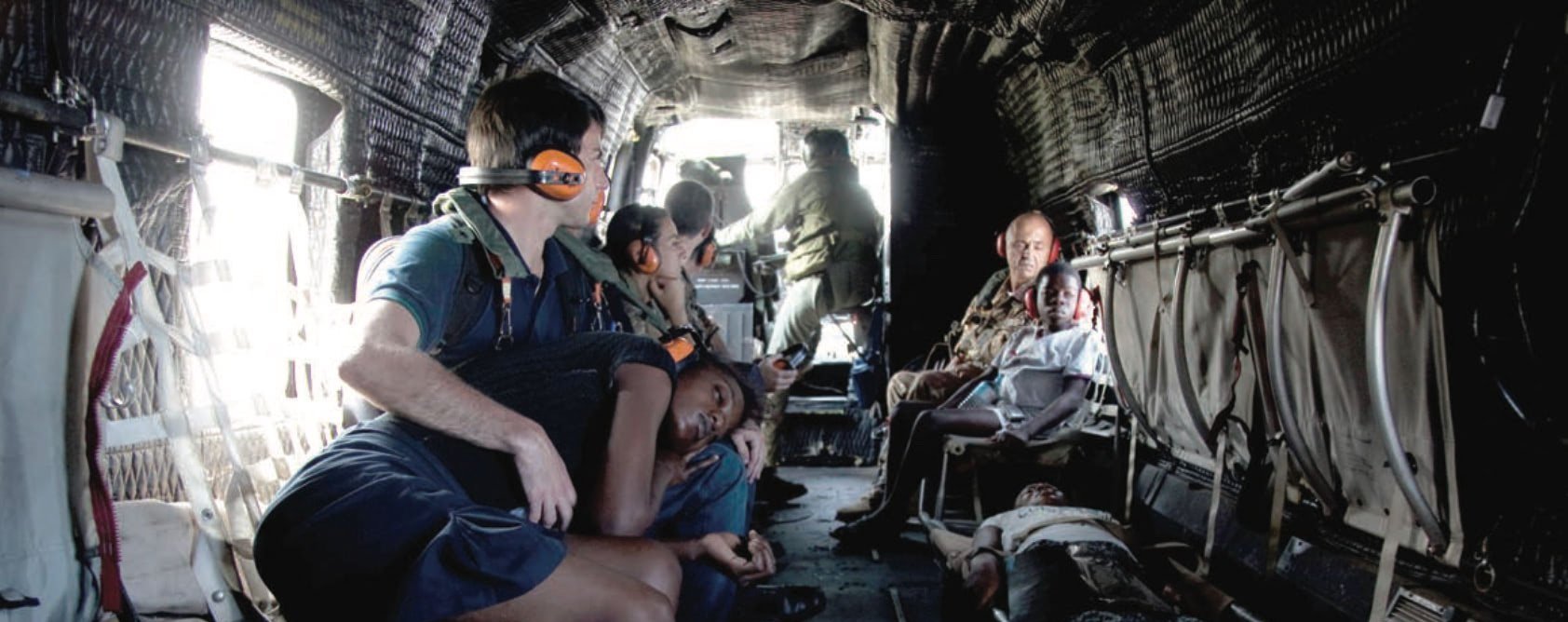
Fellowship in Disaster Medicine

Program Overview
The Beth Israel Deaconess Medical Center (BIDMC) Fellowship in Disaster Medicine began in 2007 as the first at a Harvard teaching hospital. The fellowship program is designed to provide qualified physicians the opportunity to develop an expertise in all aspects of the related fields of Disaster Medicine (DM), Emergency Medical Services (EMS), and Emergency Management (EM). Included in the program is additional focused education in International Emergency Medical Services Disaster Operations, Hospital-Based Emergency Management, Chemical. Biological, Radiological, Nuclear (CBRN) Management, Crisis Leadership and Policy, and Counter-Terrorism Medicine.
The BIDMC Fellowship in Disaster Medicine is a comprehensive training program that provides education and practical experience through operational fieldwork, didactic lectures and seminars, hands-on exercises, as well as goal-related research in a specific area of DM resulting in peer-reviewed publications. In addition to experiential learning through practical and “real-world” rotations, there is a comprehensive curriculum taught through weekly didactic sessions, along with seminars, visiting lecturers, journal club, and textbook chapter discussions. The fellowship also leads the Harvard Medical School Student Interest Group in Disaster Medicine, which numbers over 50 students and meets formally once per month.
The fellowship holds a 4-day live-in field predeployment course, during which fellows learn how to safely and effectively operate in austere conditions. Over the course of the year, fellows design and implement a full-scale exercise that involves over 200 participants and numerous state response agencies. Fellows also participate in hospital and citywide emergency preparedness meetings and drills, Boston Marathon mass casualty incident prep, and deploy to city and regional events, including the Boston Marathon. In addition to the many field rotations in Boston and the New England region, the fellowship has educational opportunities across the country and the around world.
The BIDMC Fellowship in Disaster Medicine also has the capability to independently deploy to international disasters, with logistics, communications, and operational support provided by our NGO partners. To date, the fellowship has deployed to the Haiti earthquake, Typhoon Haiyan in the Philippines, the Nepal earthquake, Hurricane Dorian in the Bahamas, the COVID-19 pandemic, and the Ukrainian humanitarian crisis.
Directors
Gregory Ciottone, MD, FACEP, FFSEM
Director, Division of Disaster Medicine, Department of Emergency Medicine, BIDMC
Associate Professor of Emergency Medicine, Harvard Medical School
Amalia Voskanyan, RN
Co-Director, BIDMC Fellowship in Disaster Medicine
Director of International Relations, Department of Emergency Medicine, BIDMC

Specialty Offerings
-
International Emergency Medical Systems (EMS)
The concentration in International EMS trains fellows in all aspects of prehospital emergency services through the exploration of global systems, and teaches best practices through field operations and comparative analysis of prehospital emergency care and access. The program provides a personalized educational experience that focuses on the practice of EMS in the United States and internationally, while also exploring the dynamics of prehospital disaster operations.
-
Hospital-Based Emergency Management
The oversight of a hospital’s mitigation, preparedness, and response to disasters are done through hospital- based emergency management. This concentration is taught by active emergency managers from major Boston medical centers. The program includes education on all steps required to make and keep a hospital working efficiently in a disaster, as well as Joint Commission requirements for emergency preparedness.
-
Chemical/ Biological/ Radiological/ Nuclear (CBRN)
The CBRN concentration is focused on the medical preparedness and response to these unconventional threats. It includes a current analysis of surge capacity, treatment modalities, and the potential effects of a major CBRN attack. It also includes the recent COVID-19 pandemic and past Influenza and Ebola events as case studies for bioterrorism preparedness.
-
Counter-Terrorism Medicine (CTM)
Terrorism threatens the use of unconventional modalities, including military- grade weapons, sophisticated explosive devices, vehicle ramming, and CBRN weapons, in sophisticated asymmetric attacks. The CTM concentration provides training in the mitigation, preparedness and response actions required by healthcare personnel for these uniquely complex and deadly events.
-
Disaster Psychology
The Concentration in Disaster Psychology provides fellows with special expertise in the psychosocial aspects of disaster preparedness and response. Fellows receive additional instruction and training in identifying and managing the trauma response; psychological first aid; crisis intervention; grief responses; cross-cultural and culturally competent interventions; and in resilience training for disaster responders.

Clinical and Field Rotations
Rotations are the cornerstone of the BIDMC Fellowship in Disaster Medicine combined program. The fellow performs rotations within the United States and around the world. In addition to the extensive disaster preparedness, response, and EMS activities in and around Boston, fellows participate in rotations in 11 countries and 9 states. Each opportunity is specifically selected for the educational experience it provides to the fellows, as they take an active and integrated role in the field, learning by experience the real-world applications of specific areas of emergency preparedness, response, and prehospital care. With each opportunity, fellows learn the necessary skills to assume leadership roles locally, nationally, and internationally through real-world experience.
Research
Fellows are required to design a research project, achieve IRB approval, conduct the research, assimilate and analyze the data, write the manuscript, and submit for peer-review publication. In July, fellows attend “Research Week”, a multi-day instructional program on basic and advanced research techniques and practices, and are closely mentored by fellowship faculty throughout the year. Fellows and faculty publish extensively in peer-review journals.
Available Fellowship Programs
-
The full residential Disaster Medicine fellowship program lasts one year and requires that fellows reside in Boston. Fellows are credentialed at BIDMC, and given an academic appointment as Research Fellow at Harvard Medical School. The fellow participates in weekly didactic sessions that include full curricula in Disaster Medicine, Hospital-Based Emergency Management, CBRN, and Counter-Terrorism Medicine. Fellows also participate in seminars, journal clubs, the HMS DM student interest group, and disaster simulation exercises at the BIDMC Center for Education and the Shapiro Simulation and Skills Center. Fellows participate in weekly educational meetings in International EMS Disaster Operations and Counter-Terrorism Medicine, and attend hospital drills at BIDMC and Boston Children’s Hospital. Fellows complete all mandatory rotations and choose optional domestic or international rotations to participate in.
Fellows participate in a number of field exercises, including the 4-day Pre-Deployment Course, disaster simulation training, and workshops in mass casualty management, the incident command system (ICS), disaster triage, logistics, communication skills, and hospital-based emergency management. Fellows also participate in operational task forces on current topics that create evidence-based guidelines and conduct research on real-time events, in addition to their independent research and publishing peer-review articles as described above.
-
The Disaster Medicine fellowship executive program lasts one year and allows fellows to reside outside of Boston. Fellows participate in weekly didactic sessions that include full curricula in Disaster Medicine, Hospital-Based Emergency Management, CBRN, and Counter-Terrorism Medicine. Fellows also participate in seminars, and journal clubs. Fellows participate in optional weekly educational meetings in International EMS Disaster Operations and Counter-Terrorism Medicine. Fellows choose optional domestic and international rotations to participate in.
Fellows have the opportunity to participate in a number of field exercises, including the 4-day Pre-Deployment Course, disaster simulation training, and workshops in mass casualty management, the incident command system (ICS), disaster triage, logistics, communication skills, and hospital-based emergency management. Fellows also participate in operational task forces on current topics that create evidence-based guidelines and conduct research on real-time events, in addition to their independent research and publishing peer-review articles as described above.
